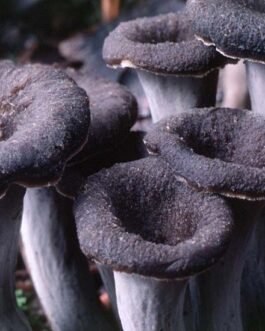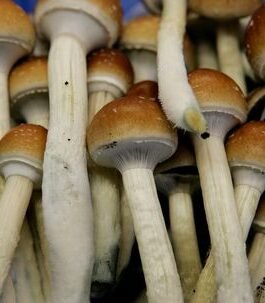Buy White Trumpet Mushrooms. Trumpet mushrooms the tall, tree-like fungi—fall in line with the rest of the oyster mushroom family, but are noticeably different in appearance than a cartoon rendering of the same variety. These tall, thick fungi are worthy of featuring as a main meal, as well as a striking side dish.
Pleurotus eryngii commonly known by the names king trumpet mushroom, French horn mushroom, and king oyster mushroom is an edible oyster mushroom with a thick white stem and a flat brown cap. When cooked, the meaty texture is comparable to seafood such as calamari, abalone, or scallops, with a hearty base flavor that makes it an appealing stand-in for meat for many vegetarians.
King trumpet mushrooms naturally grow in cooler climates throughout the Middle East, Europe, and North Africa. The fungi feeds on stems of herbaceous plants. It is possible to grow trumpet mushrooms at home with proper humidity and ventilation using a spawn mixed with a substrate, like straw or sawdust.
The king trumpet, eryngii or king oyster mushroom is the largest of the oyster mushroom genus and, unlike other oyster mushrooms, their stalks aren’t tough and woody to eat. Instead, they’re hailed for their meaty texture and umami flavour. Native to the Mediterranean, they are perhaps most commonly used in Asian cuisines such as Chinese, Japanese and Korean; three countries where the mushroom is cultivated on a large scale.
This impressive mushroom averages between 10–15cm in length, has a long shelf life in the fridge (roughly one week) and doesn’t lose its shape when cooked. The texture is sometimes likened to abalone or scallops, which makes them an interesting option for vegetarians and are often billed as ‘mushroom steaks’ or ‘vegan scallops.
The mushroom has a good shelf life and is cultivated widely. It has little flavor or aroma when raw. When cooked, it develops rich umami flavor and a meaty texture.
Pleurotus eryngii may contain chemicals that stimulate the immune system. Dietary intake of Pleurotus eryngii may function as cholesterol-lowering dietary agent.
Like some other Pleurotus species, P. eryngii attacks nematodes and may provide a control method for these parasites when they infect cats and dogs.






Reviews
There are no reviews yet.